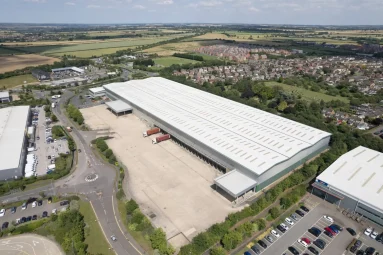
Why smart homes are the next technology supply chain challenge
Will you be ready for the next generation of supply, service and technological needs?
Will you be ready for the next generation of supply, service and technological needs?
According to the research and analytics group YouGov, “almost a quarter of Britons now own one or more smart home devices”. The figures refer to smart speakers, thermostats, lighting and security (although they exclude smart meters). Market data analysts Statista predict that the global smart home market will be worth $53 billion (£41 billion) by 2022.
The growing prevalence and connectivity of smart devices – from TVs and white goods to connected vehicles and home healthcare products – means that our world is becoming increasingly connected via digital data generation and transmission. Billions of pounds are being invested in this field, from the technology and automotive industries to the NHS Digital Transformation plan.
All this presents a number of challenges to the complex supply chains in many sectors as they are adapting to managing large amounts of data to gain valuable insights from smart devices. Find out how you can prepare for developments in this fast-developing, high-value sector.
Big questions for consumers and suppliers
‘Interoperability’ and sharing between devices could mean consumers end up having to choose which brand they subscribe to rather than which appliance they want. Having a ‘Samsung home’ or a ‘Amazon home’ (for example) could become a matter of convenience.
The question to ask is: is this what consumers really want? Elsewhere in the retail and technology markets, there is a world of choice: why be tied in to an all-encompassing contract if you can avoid it? Recently, flexible mobile contracts have become increasingly popular, while some offer the option to give extra minutes to friends or family. It’s even possible to share battery power with other phones via wireless recharging. Developments like these put limiting consumer flexibility at odds with the rest of the technology industry.
It may well be that a better move for brands is to focus on offering greater flexibility. Locking customers in could open the door for smaller contenders offering better service, as has happened in the utilities industry. In addition, cornering a market means that firms have many more customers to satisfy; here again, big electricity, gas and water companies are an example of the need for a robust customer service offering if provider choice is limited.
Whichever way the wind blows, supply chain operations will need to be ready. They will be reliant on having the right infrastructure and technical capability to cope with wider-ranging demand.
‘Who you gonna call?’ The implications for service
If products in the home are connected, will one centralised service provider need to assist with all types of devices? Similarly, if one brand is responsible for all the devices in one home, it might need to service a wider product range than ever before.
There are a number of potential issues:
In some respects, a consumer’s dependency on outside support is a customer service failure. Manufacturers instead need to prepare for self-service capabilities that allow consumers to identify and fix issues themselves without needing to call an engineer or schedule a visit. That will mean a need for reliable, self-diagnosing functionality.
Diagnostic data will become a more complex arena. Smart homes could produce a high volume of data. Will it be clear which product’s data shows the origin of a fault? It needs to be quick and easy for consumers and engineers to identify problems, instead of battling through high volumes of irrelevant reporting. There’s also the question of who owns which data. Is it the consumer or the service provider? If there are different providers, could this create an impediment to analysis and repair?
Supply chain infrastructure will need to adapt from centralised and connected organisation of repairs to parts supply for multiple items. There could be significant changes and expense involved.
There are other examples of ways in which the infrastructure for a connected home is not ready yet. Many homes – and regions – do not benefit from adequate broadband, but this would become a necessity.
Another change would be the need for collaboration, potentially between competitors. Many companies simply don’t operate in this way, so new home technologies could result in a change to established ways of working.
A role for ‘interlocutors’ – go-between service providers who work across products, services and brands – could feature heavily. This is a necessity that will need to be met by larger firms, not just independents who depend on being ‘a jack of all trades’.
Implications for health devices
It’s suggested that smart devices could save the NHS millions of pounds, especially where care for older people is concerned. Wearable technology to prevent and assess the risk of falls is already in use, while devices such as ‘assistive furniture’ could prevent inactivity. Both problems are major causes of hospital admissions. In addition, NHS introduction of Skype video calls has removed thousands of avoidable hospital trips. This is one of the ways the NHS has saved £1.3 million by providing quicker access to care.
Smart homes already connect a wide range of devices, but this could include more than just entertainment. ‘Life critical’ equipment could also become part of the equation.
Such developments would intensify demands on the supply chain. Diagnostic and reported data would have to be reliable, as would the speed of delivery. Citizens Advice report that one in four people in the UK has had a next-day or nominated delivery arrive late. Late delivery could have a huge impact for patients ordering smart diabetic testing equipment or a heart monitor – not least from the stress of waiting for an undelivered product.
Additional challenges come in the form of resourcing and organisation of service delivery: would a specialist be needed for healthcare products or could the service team for other devices cover healthcare too? There are plenty of decisions to be made to identify the right prescription for this part of the smart home supply chain.
Meeting the challenge
At Unipart, we are constantly looking to the future, identifying new developments that will impact our industry, and evolving our offerings to meet our customers’ needs.
We already provide engineer logistics support, fast delivery and diagnostics support (including machine learning and predictive failures), as well as returns and refurbishment of equipment, in very short timescales to keep the supply chain moving.
With an ever-increasing range of device capabilities on offer to consumers, smart homes represent a massive leap in their domestic, entertainment and healthcare experience. They are another clear indication of the importance of consumers and customer service in today’s supply chains. As the pace of change marches on, technology will enable them further still and your logistics operations will need to keep up. Smart homes are one thing, but how intelligent is your supply chain?
Unipart Logistics has helped engineer the supply chain for many of the world’s leading industrial companies. To find out how Unipart Logistics could help you, contact Katy Farrington: katy.farrington@unipart.com
Read more articles like this one on our Supply Chain Insights blog at Unipart.com/logistics/insights
More in Manufacturing

Intertronics: Driving Innovation in Adhesives and Assembly Solutions
For over four decades, Intertronics has been at the forefront of providing high-performance adhesives, coatings, sealants, and application equipment to industries that demand precision and reliability. From electronics and medical devices to automotive and aerospace, Intertronics’ expertise ensures that manufacturers can optimise their bonding and assembly processes with cutting-edge solutions.

Unipart named CCS supplier
Unipart has been named as a supplier on Crown Commercial Service’s (CCS) Logistics, Warehousing and Supply Chain Solutions (RM6329) framework agreement.

Owen Mumford: 70 Years of Innovation in Healthcare
Owen Mumford has been at the forefront of medical device innovation for over 70 years, pioneering solutions that enhance patient care and improve healthcare outcomes worldwide. Established in 1952 by Ivan Owen and John Mumford, the company has grown into a global leader in medical device design and manufacturing, with a commitment to quality, sustainability, and patient-centred innovation.
From this author

Unipart named CCS supplier
Unipart has been named as a supplier on Crown Commercial Service’s (CCS) Logistics, Warehousing and Supply Chain Solutions (RM6329) framework agreement.

Unipart partners GBUK
Unipart has formed a strategic partnership with GBUK

Unipart launches in Vietnam
Unipart, the supply chain performance improvement partner, has launched operations in Vietnam.

